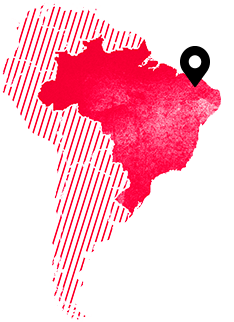The health of millions of Brazilians at stake
In conducting many studies, the researcher Ada Cristina Pontes Aguiar has established a clear link between exposure to pesticides and chronic diseases, such as cancer, and birth defects. These chemicals also end up in Brazil’s drinking water. We painted Ada Cristina using this contaminated water, to highlight the problem.
 Ceará
Brazil
Ceará
Brazil
The Swiss government takes care of the health, environmental protection and human rights of its people. Yet, at the same time, it accepts that a Swiss company earns millions at the expense of the Brazilian people. Ada Cristina researches the health impact of pesticides at the University of Ceará. She is convinced that “today, every single person in Brazil is exposed to pesticides in one way or another”.
“Syngenta earns billions at the expense of people’s suffering”
Ada Cristina Pontes Aguiar Medical researcherAda Cristina believes that we need to take a holistic view – rather than focusing on short-term profit – to change this situation. She considers the use of pesticides in Brazil to be a “serious public health issue”. She therefore advocates for more research into the health impact of highly hazardous pesticides. This is the only way, she believes, to make governments and companies realize that the production of highly hazardous pesticides needs to be halted.


